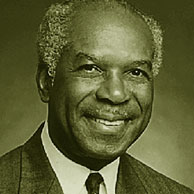Architect of social justice in medicine
As a physician, mentor, professor and dean, M. Alfred Haynes, now retired, dedicated his career to reducing health disparities and improving health care systems in the U.S. and around the world. After joining the International Health Department at Johns Hopkins School of Hygiene and Public Health in 1964, he went to India on an assignment in collaboration with the United States Agency for International Development. Tasked with improving the Department of Social and Preventive Medicine at the Medical College in Trivandrum, Kerala, Haynes created a system to place medical interns in rural primary health units for more meaningful field experiences. He also conducted research on background radiation and family planning services. Returning to Johns Hopkins in 1966, Haynes applied his lessons learned to create a program for teachers of community medicine and to develop a comprehensive health planning program. International students used principles learned in these programs to enhance health care around the world. In addition, Haynes published studies regarding opportunities for black health care professionals and contributed to the “Hunger USA” study. His research into racial health disparities led to the creation of the National Medical Association Foundation whose mission is to address the health needs of inner city residents. Haynes was the foundation’s first director. Haynes declined to become a full professor at Johns Hopkins so that he could accept the challenge of helping to establish the Charles Drew Postgraduate Medical School in the Watts area of Los Angeles in 1969. He ultimately became the dean and president of that school.
